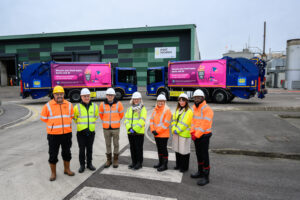Opinion: Why we need to call time on GDP
Sarah Davidson, Chief Executive at Carnegie UK, and Professor Henrietta Moore, Founder and Director of the Institute for Global Prosperity at University College London, argue in favour of new holistic approaches to measuring national prosperity.
The latest GDP figures – frequently seen as a proxy for social progress – show that the UK economy is now 1.3% above its pre-pandemic levels. But who exactly is feeling prosperous?
For decades individual economists along with organisations like the OECD, Carnegie UK, and the Institute for Global Prosperity (IGP) have questioned the adequacy of GDP as a measure of prosperity and progress. The central case against GDP is its persistent failure to provide the context in which we all live our lives, and the current GDP figures are no exception. They belie the spiralling cost of living, rocketing inflation and a widespread public view that, for the majority of us, our finances will worsen this year.
By placing an emphasis on economic growth and equating wealth with overall productive output, combined with a false presumption of “trickle-down,” governments risk neglecting the social, environmental, and democratic wellbeing of their citizens. GDP figures do not reflect whether we all have access to the foundations required for a good life and economic wellbeing. Nor do they reflect the greatest threats to our individual and collective wellbeing – climate change and biodiversity loss.
The UK Government attempts to address these challenges through its Levelling Up and Net Zero agendas, however the natural partner to both should be a new measure of societal progress and prosperity, one not swayed by investment in big ticket infrastructure programmes.
Carnegie UK and the IGP see collective wellbeing as being about everyone having what they need to live well now and in the future. This requires social, economic, environmental, and democratic wellbeing outcomes to be seen as equally important and given equal weight.
Carnegie UK propose Gross Domestic Wellbeing (GDWe), as a single figure of wellbeing to clearly show the difference between GDP and collective wellbeing. GDWe brings together data collected and published by the ONS across a range of areas of life, such as our relationships, health, governance, and the environment. By including measures of social, economic, environmental, and democratic wellbeing, GDWe can more accurately reflect the state of our nation’s wellbeing and be tracked over time to tell whether wellbeing is going up or down.
In parallel, the IGP argue that we need to redefine prosperity for the 21st century, simultaneously focusing on the well-being of people and planet, exploring the multi-dimensional, interconnecting, and intersecting nature of those relationships. We are in a critical position where we must regenerate the planet and improve the quality of people’s lives. Therefore, measuring prosperity accurately requires a whole-systems approach at the local level where specific outcomes for community and environmental health are the goal.
A citizen-led holistic approach to prosperity characterises one of the innovative features of IGP’s Prosperity Index (PI). The PI was deliberately designed as a process for understanding sustainable prosperity and how it can be delivered in every place in the UK. But this methodology has also been developed and implemented globally, in partnership with citizen social scientists (CSS) and NGOs in Tanzania, Lebanon, Nairobi and rural centres in Kenya, as well as several neighbourhoods in London, United Kingdom.
Working with CSS – trained to work as social researchers and undertake research to co-produce the PI – residents develop voice and choice in their local area, allowing them to measure and act to create shared prosperity where they live, rather than relying on an abstract set of measures and initiatives handed down from Whitehall. IGP’s citizen-led PIs use newly collected local data and secondary economic data from the ONS and other sources, providing a comprehensive overview of prosperity. Using the PI methodology, the IGP has launched a 10-year longitudinal study to track household prosperity in 13 neighbourhoods around the Olympic Park, with the first results due to be published this summer.
Both IGP and Carnegie UK believe that we need to measure more than economic performance if we are to accurately reflect lives lived in the round, with the consequences of policies and government actions reaching every area of life. Broadening the measure of prosperity and wellbeing using GDWe and locally defined measures would ensure more effective and long-term Government policies, recognising the scope for actions to improve wellbeing in more than just the initially intended policy area.
Policies on active travel are a helpful example of this thinking. Travelling by walking, cycling, or wheeling has health benefits, improving our social wellbeing. The reduced reliance on cars and the emissions associated with them improves our environmental wellbeing. The decreased need for petrol puts more money in pockets, improving economic wellbeing, as does investment in infrastructure to make active travel safer and quicker.
Active travel can also boost local business, encouraging people to shop locally and supporting neighbourhood amenities. To be truly holistic, democratic wellbeing must also be considered in policymaking, giving people voice and choice. This could be done through local deliberation on priorities for active travel investment, or by involving community organisations in the promotion of active travel routes.
If the UK Government is reluctant to let go of outmoded metrics like GDP, the IGP proposes that the ONS publish 10 additional statistics alongside quarterly GDP figures – including factors such as air, water, social capital, domestic violence – to give a more rounded picture of the Nation’s prosperity. A further ‘State of a Nation’ report would describe whatever work the UK has undertaken in the last year to improve our collective prosperity and wellbeing.
Whatever language is used – wellbeing or prosperity – we both agree that policymakers need to take a holistic approach, and that to do this effectively an alternative measure of social progress is required.
GDP is a 20th century measure of prosperity, from a time when the connection between national wealth and reducing poverty was linear. Our lives today are more complex, and the foundations of our wellbeing more diverse. Addressing the challenges of the 21st century therefore requires governments to have information on our economic, social, environmental, and democratic dimensions of wellbeing in order to provide clear information about how we are living – well or otherwise – together.
Image credit: Natalya Letunova and Dmitry Vechorko

















